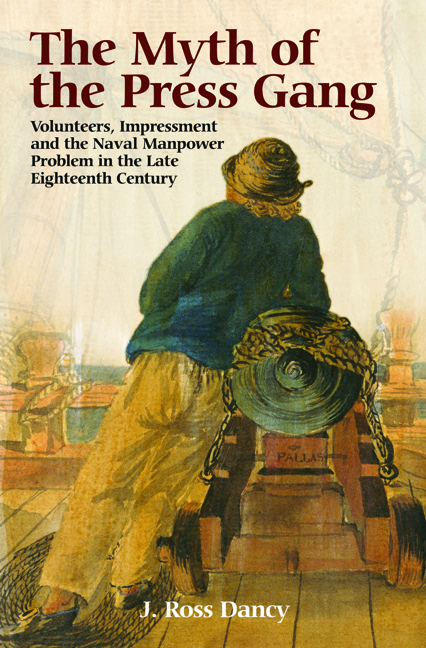 The Myth of the Press Gang
The Myth of the Press Gang 5 - The Quota Acts
Published online by Cambridge University Press: 05 May 2015
Summary
At the beginning of 1795 Britain was in a precarious position in a war that was quickly expanding. The separation from the European continent offered by the English Channel greatly benefited the British Isles. However, the narrow sea was by no means an insurmountable obstacle for potential invaders, as Britain had seen several invasions over its history; the last of which, led by William III, was only removed from 1795 by just over a century. Nevertheless, this narrow strip of sea did offer Britain breathing room, as moving armies across the Channel was complicated and costly. This allowed Britain to prioritise its naval forces above its army in a manner that continental powers could not. It was the Royal Navy that provided the wooden walls that protected Britain, and in 1795 its primary mission was to guard against invasion, as it had been for nearly 400 years. At the end of the eighteenth century Britain stood as the dominant European naval power, in large part due to the ability of the Royal Navy to employ more seafarers than its rivals.
British naval forces had grown rapidly over the eighteenth century, and by the end of 1794, after only two years of mobilisation, the wartime Royal Navy was nearly twice the size it had been half a century earlier in the midst of the War of Austrian Succession, topping 85,000. More importantly, British maritime activity had undergone remarkable expansion in the second half of the eighteenth century. The strength of the merchant marine was essential for naval supremacy, as the mariners who were trained in seaborne trade formed the pool from which the Royal Navy manned its fleets. Seamen proved to be the nation's most important form of labour, and serving in British warships they formed the nation's largest workforce.
- Type
- Chapter
- Information
- The Myth of the Press GangVolunteers, Impressment and the Naval Manpower Problem in the Late Eighteenth Century, pp. 157 - 185Publisher: Boydell & BrewerPrint publication year: 2015


